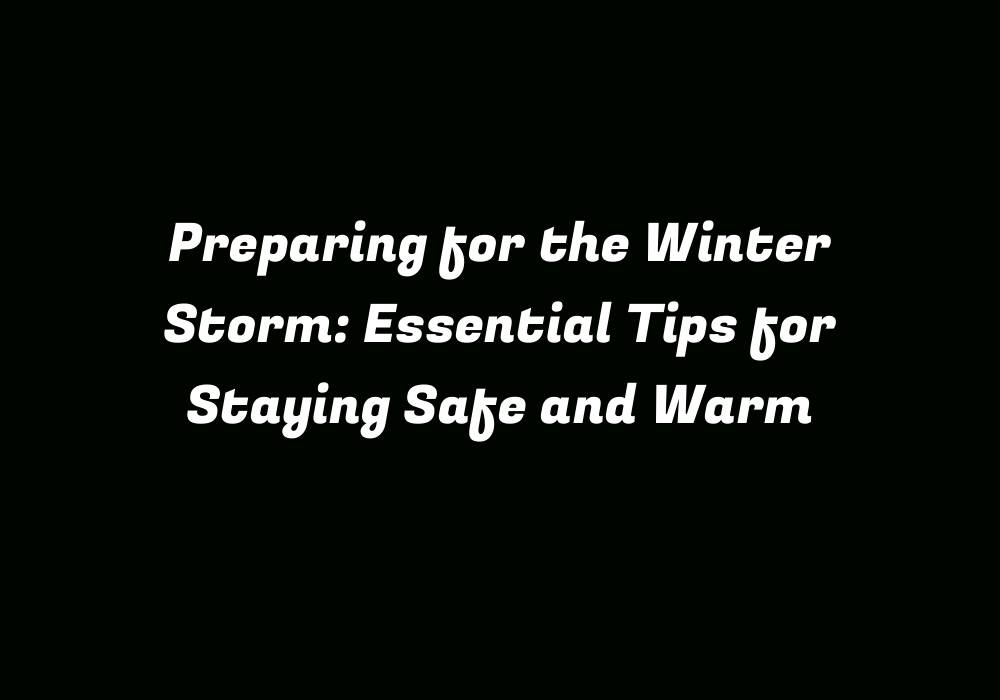Preparing for the Winter Storm: Essential Tips for Staying Safe and Warm
Winter storms can be unpredictable, bringing about various challenges that may threaten our safety and wellbeing. To prepare adequately, it’s crucial to have a game plan and implement essential tips that ensure we stay safe and warm during these weather events.
Stock Up on Supplies
Food: Ensure you have enough non-perishable food items that can last for a few days. Consider purchasing canned goods, cereals, pasta, and other easy-to-prepare foods. Remember to include water as well. Storing bottled water or filling up several jugs with water will help keep everyone hydrated during power outages.
Heating: Invest in emergency heating sources such as portable heaters and fireplaces that have safety features, like automatic shut-off when tipped over. A well-stocked supply of wood or other fuel is essential for these alternative heating methods. Make sure you know how to operate them safely.
Lighting: Assemble battery-powered lanterns and flashlights with extra batteries, as they are invaluable when the electricity goes out. Consider purchasing a few candles and matches for additional light sources.
Ensure Your House is Secure
Weatherproofing: Check your windows and doors for cracks or loose panels, especially if they are older models. Caulking can be an effective solution to prevent drafts from entering your home during severe weather.
Insulation: Insulating your attic, walls, and crawl spaces can help keep heat in and cold air out during the winter months. Consider adding insulation if necessary for maximum efficiency and energy savings.
Check your Heating System: Regularly maintain and service your heating system before the onset of a storm. If you have an older furnace, consider investing in a more efficient one to reduce energy consumption and help save money during the winter months.
Create an Emergency Plan
Know your neighbors: Building strong relationships with nearby residents can be beneficial when facing severe weather conditions. You can share resources, support one another during power outages and assist each other in case of emergencies.
Know your routes: Make sure you are familiar with alternate routes to work, school, or other essential destinations. This will help ensure a smooth commute when roads may be closed due to hazardous conditions.
Have an emergency kit ready: Assemble a collection of emergency supplies such as first aid kits, blankets, a battery-powered radio, and any necessary medications for each family member. Ensure these items are easily accessible in case you need to evacuate your home.
Staying Safe During the Storm
Monitor weather updates: Stay informed by listening to local radio stations or checking online sources for reliable information on the storm’s progress. This will help you adjust your plans accordingly and make necessary preparations.
Stay inside and away from windows: During a severe winter storm, it is best to remain indoors where possible. Avoid opening windows or doors to reduce heat loss. Keep the thermostat at a warm but energy-efficient setting to ensure you have enough heat while conserving power.
Dress appropriately: Wearing layers of clothing is important, as it helps maintain body warmth and prevents heat from escaping. Ensure your feet stay warm with insulated socks or boots, and keep an extra pair by the door for when you venture outside to check on your car or clear snow.
Coping with Power Outages
Conserve energy: Turn off unnecessary devices and appliances when the power goes out. This will help minimize strain on the electricity grid, allowing it to be restored more quickly once service is available.
Be prepared for food storage: If you rely on a refrigerator or freezer to preserve your food supply, prepare a cooler filled with ice and blankets in advance. This will help keep perishable items cold if the power goes out.
Avoid dangerous practices: Never use generators, grills, camp stoves, or other equipment indoors, as they pose a significant risk of carbon monoxide poisoning. Always follow manufacturer’s instructions and safety precautions to ensure safe operation.
Post-Storm Recovery
Assess the damage: After the storm has passed, check for any damages to your home or surrounding property. Inform your insurance company if necessary, and document the extent of the damage for future reference.
Be cautious with downed power lines: Treat all downed power lines as if they are live, keeping yourself and others at a safe distance until utility crews have had an opportunity to secure them. Avoid using any equipment or tools near these areas for your safety.
Help those in need: If you observe that someone is stranded, trapped, or experiencing an emergency during the storm, offer assistance if it is safe to do so and contact emergency services for professional help.
Preparing for a winter storm can be daunting, but following these essential tips ensures your safety and wellbeing throughout the duration of the event. Being proactive and informed will go a long way towards ensuring you are ready to face any challenges that come your way during this unpredictable weather season.
Remember, staying organized and remaining vigilant is crucial for successfully navigating through winter storms and coming out stronger on the other side.
